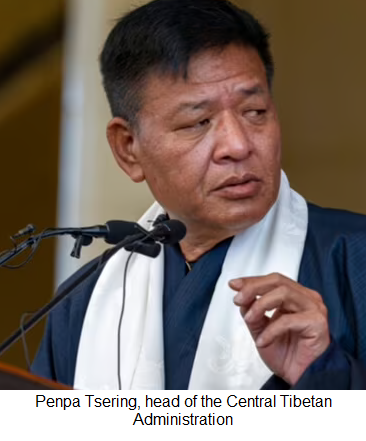Exiled Leader Says Tibet Faces ‘Slow Death’ Under China

Penpa Tsering, head of the Central Tibetan Administration
Tibet is dying a “slow death” under Chinese rule, the head of the India-based organization known as Tibet’s government in exile told a U.S. agency Tuesday.
Some activists lament what they see as a fading focus on alleged abuses in Tibet amid growing concerns in Washington and other Western capitals about China’s expanding military, pressure on democratic Taiwan, and crackdowns in Hong Kong and on minority groups in China’s Xinjiang region.
“If PRC [the People’s Republic of China] is not made to reverse or change its current policies, Tibet and Tibetans will definitely die a slow death,” Penpa Tsering of the Central Tibetan Administration said via video link to a hearing of the Congressional-Executive Commission on China, an independent agency of the U.S. government that monitors human rights and rule of law developments in China.
The Central Tibetan Administration leadership role was created in 2012 after the Dalai Lama, Tibetans’ 87-year-old spiritual leader, relinquished political authority in favor of an organization that could outlive him.
Beijing has accused the Dalai Lama of fomenting separatism in Tibet, and it does not recognize the CTA, which represents about 100,000 exiled Tibetans living in about 30 countries including India, Nepal, Canada and the United States.
The Chinese Embassy in Washington did not respond to a request for comment on the hearing.
China has ruled the remote western region of Tibet since 1951, after its military marched in and took control in what it called a “peaceful liberation.” China denies wrongdoing there and says its intervention ended “backward feudal serfdom.”
Uzra Zeya, U.S. undersecretary of state for democracy and human rights, told the hearing that China continued to “wage a campaign of repression that seeks to forcibly Sinicize” the 6 million Tibetans in the country and eliminate Tibetan religious, cultural and linguistic heritage.
Recent reports on government-run boarding schools and involuntary mass DNA collection in Tibetan areas “shock the conscience,” said Zeya, who as special coordinator for Tibetan issues leads U.S. support for Tibetans. Beijing has refused to deal with her.
Republican U.S. Representative Chris Smith, who chairs the commission, said there was a global focus on Taiwan, Hong Kong and Xinjiang, but “we cannot take our eyes off the ongoing genocide being committed against Tibetan people.”
Actor and longtime Tibet activist Richard Gere told the hearing that Chinese policies in Tibet increasingly “match the definition of crimes against humanity.”
China says Tibet is part of its territory and that it has improved living conditions and reduced poverty in the region. China says any accusations that it is violating Tibetans’ human rights are false.
–A VOA report, Mar 28, 2023
https://www.voanews.com/a/exiled-leader-tells-us-congress-tibet-faces-slow-death-under-china/7026138.html
-
Book Shelf
-
 Book Review
DESTINY OF A DYSFUNCTIONAL NUCLEAR STATE
Book Review
DESTINY OF A DYSFUNCTIONAL NUCLEAR STATE
- Book ReviewChina FO Presser Where is the fountainhead of jihad?
- Book ReviewNews Pak Syndrome bedevils Indo-Bangla ties
- Book Review Understanding Vedic Equality….: Book Review
- Book Review Buddhism Made Easy: Book Review
- Book ReviewNews Elegant Summary Of Krishnamurti’s teachings
- Book Review Review: Perspectives: The Timeless Way of Wisdom
- Book ReviewNews Rituals too a world of Rhythm
- Book Review Marx After Marxism
- Book Review John Updike’s Terrorist – a review
-
-
Recent Top Post
-
 Commentaries
Impasse over BRI Projects in Nepal
Commentaries
Impasse over BRI Projects in Nepal
-
 CommentariesNews
Yet another Musical Chairs in Kathmandu
CommentariesNews
Yet another Musical Chairs in Kathmandu
-
 CommentariesTop Story
Spurt in Anti-India Activities in Canada
CommentariesTop Story
Spurt in Anti-India Activities in Canada
-
 NewsTop Story
Nepal: Political Stability Under Threat Again
NewsTop Story
Nepal: Political Stability Under Threat Again
-
 NewsTop Story
Accountability Tryst With 2024 Ballot….
NewsTop Story
Accountability Tryst With 2024 Ballot….
-
 NewsTop Story
What Would “Total Victory” Mean in Gaza?
NewsTop Story
What Would “Total Victory” Mean in Gaza?
-
 CommentariesTop Story
The Occupation of Territory in War
CommentariesTop Story
The Occupation of Territory in War
-
 CommentariesTop Story
Pakistan: Infighting in ruling elite intensifies following shock election result
CommentariesTop Story
Pakistan: Infighting in ruling elite intensifies following shock election result
-
 CommentariesTop Story
Proforma Polls in Pakistan Today
CommentariesTop Story
Proforma Polls in Pakistan Today
-
 CommentariesTop Story
Global South Dithering Away from BRI
CommentariesTop Story
Global South Dithering Away from BRI
-
AdSense code



















